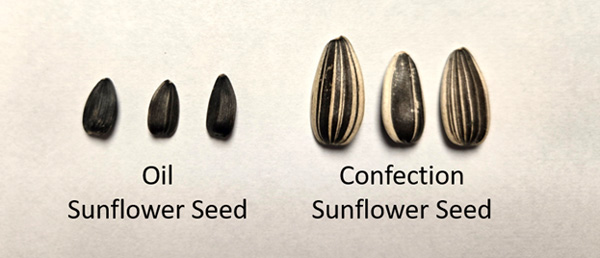Have you considered growing sunflowers as part of your summer crop plans? Sunflower producers have a number of market types to choose from when deciding to raise a sunflower crop. Depending on which market a farm is producing for, specific hybrid types should be selected to meet a particular market.
Two types of sunflowers can be produced. They are oil sunflowers and confection sunflowers (Figure 1).

Figure 1. Characteristics of oil sunflower seeds and confection sunflower seeds. Photo by Jeanne Falk Jones, K-State Research and Extension.
The largest market category exists for sunflower oil. In general, sunflower oil is used in cooking, and you will likely find it on grocery store shelves. Sunflower oil is light in taste and appearance and supplies more Vitamin E than any other vegetable oil. It combines monounsaturated and polyunsaturated fats with low saturated fat levels. Oil-type sunflower varieties need to be planted when producing for an oil market.
The current most desirable oil market type is high oleic oil. This has changed over the years with sunflower breeding efforts and market demand targeting high oleic oil. Currently, when purchasing sunflower varieties for an oil market, the sunflower hybrids need to be high oleic oil types. While markets exist for other oil types, discounts may be applied for linoleic and NuSun type varieties. As a result, when ordering seed for oil markets, ask the seed dealer for a high Oleic type variety.
High oleic sunflower oil is very high in oleic (monounsaturated) acid. High oleic sunflower oil is usually defined as having a minimum of 80% oleic acid (a description of oil fat type). The oil has a very neutral taste and provides excellent stability without hydrogenation. High oleic sunflower oil offers a trans-fat-free oil solution for customers. The oil has many uses, including bakery applications, spray coating oils for cereal, crackers, and dried fruit; it is used in non-dairy creamers, many types of frying, and other uses. High oleic sunflower oil is low in saturated fat and has a longer shelf life making this oil type the predominant market type used in the industry today. Sunflower oil market representatives can be asked which oil-type sunflower hybrids have high oleic traits. In addition, at delivery, there are quality characteristics that are also important, such as oil percentage and test weight. Premiums are paid for oil percentages over 40%, with discounts for oil percentages below 40%. Test weight is also an important factor, with higher test weights being important.
Another sunflower market class is birdseed. Most oil-type sunflower varieties work fine for the bird seed market, and oil percentage is less important for this market. However, test weight is important for this market. Low test weight can cause discounts to occur. Sunflowers grown for birdseed markets are grown with the same agronomic practices as the oil type.
Last, another sunflower market is the confection market. Confection sunflower is a separate classification from other markets and requires confection-type hybrids to be planted. As a result, when ordering seed, communicate which market type hybrid you will need. Confection seeds delivered to an oil market will be discounted heavily and may be rejected. The same marketing issue occurs if an oil-type hybrid is delivered to a confection buyer; the load will be rejected. Therefore, if producing for a confection market, a production contract is needed, and seed ordering needs to be directed to a confection sunflower hybrid only. Seed size is important when producing for a confection market, as large-sized seeds will generate a premium. The premium is paid for seed that flows over a 22/64 screen. Currently, confection markets in Kansas and the surrounding states are limited.
Delivery points in the High Plains exist at various locations. A current list of sunflower buyers and sellers can be found at the National Sunflower Association website at www.SunflowerNSA.com/buyers, and current prices are posted at www.sunflowernsa.com/growers/Marketing/daily-oilseed-sunflower-price/
Jeanne Falk Jones, K-State Multi-County Agronomist
jfalkjones@ksu.edu
Ron Meyer, Colorado State University Agronomist
rf.meyer@colostate.edu